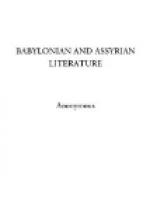[Footnote 3: “The temple of the East.”]
[Footnote 4: “The temple of the land of forests.”]
[Footnote 5: Lacuna.]
ACCADIAN PROVERBS AND SONGS
TRANSLATED BY REV. A.H. SAYCE, M.A.
The following is a selection from an interesting collection of Accadian songs and proverbs, gjven in a mutilated reading-book of the ancient language which was compiled for the use of Assyrian (or rather Semitic Babylonian) students. These sentences were drawn up at a time when it was necessary for the scribes to be familiar with the old language of Accad, and to be able to translate it into Assyrian, and hence these phrases are of very great philological value, since they indicate often analogous words and various verbal forms. The Assyrian translation and the Accadian texts are arranged in parallel columns. Some of the proverbs must be taken from an agricultural treatise of the same nature as the “Works and Days” of Hesiod. Copies of the texts will be found in the “Cuneiform Inscriptions of Western Asia,” Vol. II, 15, 16.
ACCADIAN PROVERBS
1 Door and bolt are made fast. 2 Oracle to oracle:
to the oracle it is brought.[1] 3 The cut beam he
strikes: the strong beam he shapes. 4 The resting-place
of the field which (is) in the house he
will establish.
5 Within the court of the house he feels himself
small. 6 A heap of witnesses[2] as his foundation
he has made strong. 7 Once and twice he has made
gains;[3] yet he is not content. 8 By himself he
dug and wrought.[4] 9 For silver his resting-place
he shall buy. 10 On his heap of bricks a building
he builds not, a beam he
set not up.
11 A house like his own house one man to another
consigns. 12 If the house he contracts for he does
not complete, 10
shekels of silver he pays.
13 The joists of his wall he plasters. 14 In the
month Marchesvan,[5] the 30th day (let him choose)
for removal.
15 (Let him choose it, too,) for the burning of weeds.
16 The tenant of the farm two-thirds of the produce
on his
own head to the master of
the orchard pays out.
[Footnote 1: That is, “compared.”]
[Footnote 2: Accadian “izzi ribanna,” Assyrian “igar kasritu” ("heap of covenant"), like the Hebrew “Galeed,” Aramaic “Yegar-sahadutha” (Gen. xxxi. 47).]
[Footnote 3: That is, “the more a man has, the more he wants.”]
[Footnote 4: That is, “if you want a thing done, do it yourself.”]
[Footnote 5: October.]
ACCADIAN SONGS
26 (If) evil
thou hast done,
(to) the sea forever
...[1] thou goest.
23 My city bless:
among my men
fully prosper me.
26 Bless everything;
and to (my) dress be favorable.




